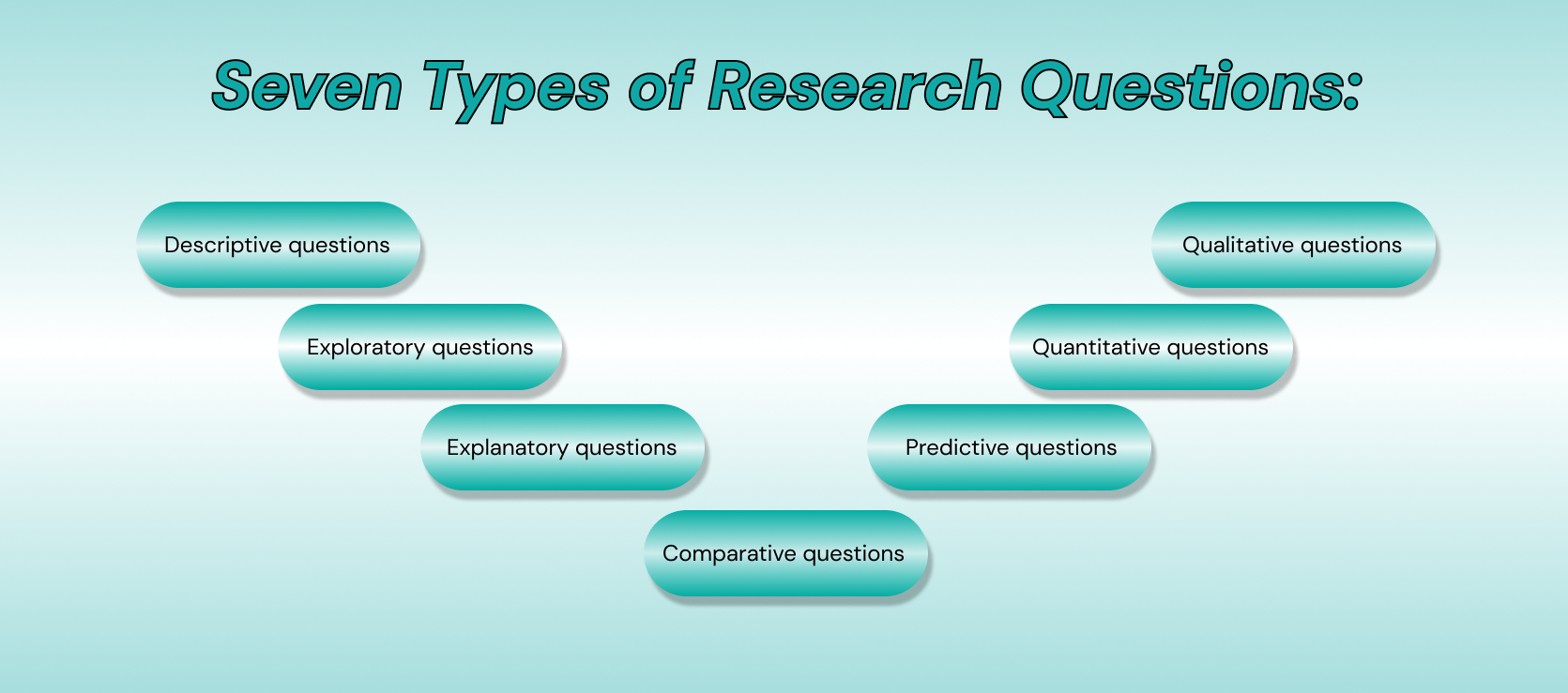In the hallowed halls of a private middle school, I, Nicholas, am fortunate to wear many hats. I am not just a teacher of English literature but also an amateur actor and a devoted guitar player. But beyond these artistic pursuits, I find great joy in helping students navigate the research world. Today, I invite you to join me on a journey into the interesting art of crafting research questions. Moreover, you will find out how to write a good research question and check out a few exam preparation tips that might come in handy.
Some Tips on What Makes a Good Research Question
Before we dive into the intricacies of research questions, let’s first understand what makes a good research question:
- A good research question is focused. A well-constructed research question narrows in on a specific topic. Instead of attempting to cover everything under the sun, it zeroes in on a particular aspect, making the research more manageable and precise.
- A good research question is clear and concise. Clarity is crucial. An effective research question leaves no room for ambiguity. It conveys its purpose and intent directly and succinctly.
- A good research question is researchable. It must be feasible to answer. A question that cannot be addressed with available data, resources, or methods is not a good research question. It should be within the realm of possibility to find an answer.
- A good research question is relevant. It addresses a topic that holds significance and relevance within your field or area of study. A question that doesn’t contribute to the existing knowledge is often not worth pursuing.
- A good research question is original. While building upon existing research is essential, your question should offer a fresh perspective or explore uncharted territory. It should seek to add something new to the discourse.
If you’re dealing with a complex subject, check out these real estate finance research topics, or some cell biology research project topics, or perhaps top-class ethics research paper ideas will help you pick the right angle to study.
Seven Types of Research Questions
Research questions are the compass guiding us through the labyrinth of knowledge and help us understand how to write math research properly. They come in various forms, each designed to serve a distinct purpose. Let’s take a closer look at these five common types of research questions to gain a deeper understanding:
1. Descriptive questions
Descriptive questions seek to paint a detailed picture or provide an account of a particular phenomenon. They are like a magnifying glass, allowing researchers to examine and understand the subject closely. For example, in ESL (English as a Second Language), a descriptive question might be, “What are the key characteristics of a successful ESL program in that journal?” Researchers aim to meticulously document and analyze the essential traits contributing to program success.
2. Exploratory questions
Such questions are the pioneers of research. They are often used in an investigation’s initial stages to understand a topic better. The example can be a what to know about dreams essay. In the world of ESL, an exploratory question could be, “What present factors contribute to ESL students’ motivation to learn English?” Other researchers embark on a journey of discovery, seeking insights that may not be immediately apparent.
3. Explanatory questions
Explanatory questions dive deep into the intricate web of cause-and-effect relationships between variables. These questions work to uncover the mechanisms behind observed phenomena. In the context of ESL, an explanatory question might be, “How does the teaching method impact ESL students’ language proficiency?” Here, researchers delve into the intricacies of teaching approaches to understand their direct influence on language skills.
4. Comparative questions
Such questions thrive on contrast. They involve examining two or more groups or phenomena to identify differences or similarities. For instance, a comparative question in ESL research could be, “Is there a significant difference in language acquisition between ESL students who receive one-on-one tutoring and those in group classes?” Researchers aim to uncover valuable insights into effective teaching methods by comparing these two settings.
5. Predictive questions
Predictive questions are the fortune tellers of research. They aim to forecast future outcomes based on existing data and trends. In the world of ESL, a predictive question might be, “Can we predict ESL students’ academic success based on their early language development?” Other researchers attempt to use early language proficiency to predict future achievement, providing valuable guidance for educators and policymakers.
6. Quantitative questions
Such questions are structured to gather numerical data and are often used to measure and analyze relationships between variables, like in a cool statistics research paper college, for instance. Here are several quantitative questions examples: “What is the average income level of households in a specific urban area?” “How does the frequency of exercise correlate with body mass index (BMI) in a sample of adults?”
7. Qualitative questions
How to write qualitative research questions? To write qualitative research questions effectively, start with a clear research objective, use open-ended language, and avoid leading questions. Phrase questions concisely, focusing on one aspect at a time, and begin with “How” or “What” to encourage in-depth responses. Pilot test and revise your questions to ensure they align with your research design and objectives.
Each of these five types of writing research questions has its unique role and purpose, shaping the course of research endeavors.
Whether you’re embarking on a journey to describe, explore, explain, compare, or predict, choosing your research question template is a critical step in determining the path you will take in pursuing knowledge.

So, How to Make a Research Question?
Now that we understand what constitutes a good research question and the different types of questions, let’s explore how to write a research question:
- Choose a specific topic. Start by selecting a topic that piques your interest and is relevant to your field of study. Your research question will revolve around this topic.
- Review existing literature. Before formulating your question, thoroughly review existing literature. It will help you identify gaps in knowledge and areas that warrant further investigation.
💡 Oftentimes, students have to research tricky issues, like historical events or other problems, and it might be a challenge to find relevant sources. If this is the issue you have faced, you can browse our pool of paper examples, find the one relevant to your topic, and learn the list of references that are credible for this particular topic. For example, if you have to write a history essay about the events of 1900th, you can browse our Russian Revolution essay sample and see the relevant sources cited.
- Determine the type of question. Based on your research goals, decide which research question aligns best with your study. Are you seeking to describe, explore, explain, compare, or predict?
- Narrow your focus. Refine your topic into a specific, manageable research question. Avoid overly broad questions that are difficult to answer comprehensively.
- Consider feasibility. Ensure that your research question is researchable. You should have access to the necessary data, resources, and methods to answer it effectively. You can learn more about feasibility in this guide to case study writing crafted by our experts.
- Make it clear and concise. Craft your research question with precision. It should be straightforward and free from ambiguity.
- Seek feedback. Do not hesitate to seek feedback from peers, mentors, or colleagues. They can provide valuable insights and help you fine-tune your question. How to create a research question? Easy!
Some Good Research Questions Examples For You
Research questions are the compass guiding the voyage of knowledge in any field. They are the foundation for the entire research endeavor, setting the course for exploration and discovery. In this section, we will explore research questions examples that span different domains and types, shedding light on what distinguishes them as effective and valuable inquiries. Also, don’t miss our helpful guide for summaries, to get a better idea on precise and straightforward writing.
So, what is the most effective type of research question?
When embarking on a research journey, one of the initial considerations is the type of research question to pursue. Different types of questions serve distinct purposes in the world of inquiry. Speculative research questions and good research questions examples such as “What might be the implications of artificial intelligence in healthcare in the next decade?” often open up possibilities and encourage creative thinking. Descriptive questions, on the other hand, provide a detailed account of a phenomenon. Some example of research questions, such as “What are the key characteristics of sustainable urban development?” seeks to offer a comprehensive description.
Exploratory questions aim to understand a topic better, such as “How do early childhood experiences influence adult mental health?” These questions delve into uncharted territory, seeking to uncover new insights.
Explanatory questions, like “What are the causal factors behind climate change?” explore cause-and-effect relationships, offering a deeper understanding. Lastly, others use predictive questions, such as “Can we predict stock market trends based on historical data?” and aim to forecast outcomes based on existing information. The effectiveness of a research question depends on the research goals and the nature of the inquiry, making each type valuable in its own right.
Do you know how to phrase a research question?
Now, you do know how to write research questions. And phrasing a research question is an art that requires precision and clarity. Formulating a research question begins with identifying the topic of interest. Once the topic is defined, researchers must narrow it to a specific aspect that can be feasibly investigated. For instance, if the topic is “climate change,” researchers might narrow it down to “the impact of climate change on coastal communities.”
Next, the question should be clear and concise. It should convey the purpose of the research and the variables being studied. In the case of our example, a well-phrased research question could be, “How do rising sea levels, attributed to climate change, affect the resilience of coastal communities?” This question is specific and conveys the cause-and-effect relationship being explored. Additionally, it should be researchable, meaning that data, resources, and methods should be available to address the question effectively.
Researchers can seek feedback from peers or mentors to refine the phrasing, ensure clarity, and avoid doing bad research.
Finally, what is a research question?
So, what is a research question? At its core, a research question is an inquiry that defines the scope and purpose of a research study. It serves as a roadmap for the entire research process, guiding researchers from the initial idea to the conclusion. A research question is not a statement or a hypothesis but rather an open-ended query that seeks to uncover new knowledge or gain a deeper understanding of a particular topic. It is characterized by its specificity and relevance to the field of study.
A good research question should be focused on a specific aspect of the topic, be clear and concise in its phrasing, and be researchable with available resources.
Examples of research questions could be, “What are the effects of technology-assisted learning on the academic performance of primary school students in rural areas?” This question outlines the specific focus (technology-assisted learning), the target population (primary school students in rural areas), and the outcome of interest (academic performance). It is a question that can be explored through data collection and analysis, making it a valid research inquiry. Now you know how to make a research question! You can also read these transfer essay examples or focus on our informative economic research report guide to get more tips from our experts that will help you manage your assignments faster.




